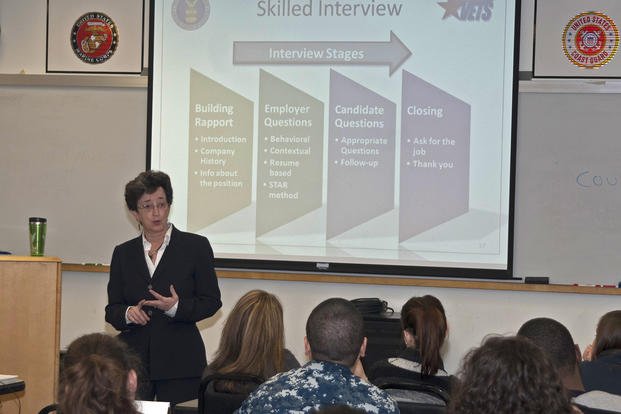The opportunity to make a good first impression is very small. In fact, most people know if they like you or not within 10 seconds of meeting you, according to published reports.
And if you're interviewing, that first 10 seconds is vital. In order to make a good impression in an interview, you need to have good body language, communication skills and confidence. Most service members already have these attributes. But if you need a refresher course in "how to make a good first impression," here are four ways to make the most of that first 10 seconds, according to Hopkins-Business Communications:
1. The Eyes Have It.
Great eye contact is a must during job interviews. When you meet someone for the first time, look directly in their eyes. In fact, try to notice the interviewer's eye color, and you'll find yourself involuntarily smiling. The interviewer will pick up on that and pick up on your mood.
2. Don't Worry, Be Happy.
Let's say that you got in a slight fender bender before the interview. If you go to the interview upset, the interviewer will pick up on your bad mood. Try to take a few deep breaths before you go into an interview and think positively.
3. Mirror Your Interviewer.
Adjust your posture, voice and gestures to those of the interviewer. Speak at their pace and volume level. This will help establish a rapport with the other party.
4. Focus on Your Communication Skills.
Nervousness might make you talk too fast. When you're asked a question, take a few seconds to think about your response before you answer. What's more, try to avoid sounding rehearsed. Try to make your answers more conversational. And watch out for your nonverbal cues, such as jittery movements or twitching. Your body language can say more about how nervous you are than your answers.
Ten seconds can feel like a lifetime in an interview. But if you use these tactics, you can leave the interview knowing that you made a great first impression.
For more information about transitioning into civilian careers, visit www.military.com/careers.
Want to Know More About the Military?
Be sure to get the latest news about the U.S. military, as well as critical info about how to join and all the benefits of service. Subscribe to Military.com and receive customized updates delivered straight to your inbox.











